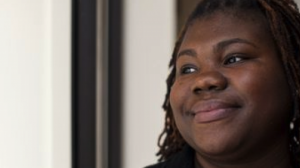
This post originally appeared at Talk Poverty.
On July 9, House Budget Committee Chairman Paul Ryan held the fifth in a series of hearings entitled “A Progress Report on the War on Poverty.” The hearings have included seventeen witnesses: academics and policy wonks, social service providers and advocates, a politician and faith leaders. But until Tianna Gaines-Turner was asked by the Democratic minority to testify at this hearing, the Committee hadn’t heard from a single person actually living in poverty. Seventeen experts on poverty and, among them, only one poor person.
One might assume that the experience of a woman trying — along with her husband — to build a secure life for her family on poverty wages and federal assistance would mean a lot to representatives who are trying to assess the effectiveness of the government’s anti-poverty programs. And, at first listen, it might have seemed that the members were open to learning from Gaines-Turner. Ryan quoted from her previous written testimony in his opening remarks, affirming her assertion that to reduce poverty we must understand and address the needs of whole persons, rather than treating “people as numbers.” He said that he hoped the committee would “listen and learn” from her testimony.
And Ryan wasn’t the only committee member who praised Gaines-Turner’s unique contribution to the series of hearings. There were at least six explicit mentions of how important it was to have her — a person living in poverty — there to testify. Both parties seemed grateful that they had an opportunity to hear a real account of struggles with financial insecurity. What unfolded, however, revealed that some legislators had a very different objective.
Heather Reynolds of Catholic Charities Fort Worth and Jennifer Tiller of American Works DC were the two other witnesses selected by the Republican majority for the panel. Their testimony and a large number of the questions asked by conservative representatives, reflected a real bias in these anti-poverty discussions: the entrenched belief that poor people will have the better life that they want when they get a job.
Both Reynolds and Tiller insisted on the importance of getting their clients off of government assistance and into employment whenever possible — they testified that these steps were key to their organization’s definition of successfully getting clients out of poverty. Work-first policies and work requirements for welfare programs where mentioned repeatedly. The importance of “accountability” and “independence” was raised more than a few times (though always in reference to individuals receiving government assistance, until Gaines-Turner noted that there should be accountability for corporations like Target and Walmart, which bank huge profits while paying poverty wages or exploiting tax loopholes). “Receiving federal aid” was used interchangeably with “dependence on the government.”
If this had been a hearing on work-first programs or the efficacy of work requirements for recipients of federal aid, that might have been expected. But the title of this hearing was Working Families in Need, and Gaines-Turner and her husband both already have jobs.
Simply put, conservative members of the House Budget Committee didn’t show up on July 9 to listen to Gaines-Turner or to learn about the experiences of the working poor. They came to preach what they think they already know about people in poverty. They made Gaines-Turner repeatedly remind them that she and her husband have jobs, and when she tried to pivot to other issues that complicate her financial security — low wages, lack of affordable childcare, asset limits in assistance programs — she was asked whether or not she would prefer to be independent rather than rely on the government. It was embarrassing — not for Gaines-Turner, who handled the pressure and condescending questions with grace — but for the members who showed how unwilling they were to use this hearing to actually listen and learn rather than just hear themselves talk.
Perhaps no member exemplified more than South Carolina Representative Tom Rice the desire to repeatedly assert his own opinion rather than listen to Gaines-Turner talk about her experiences. After getting all three witnesses to confirm that federal anti-poverty programs alone will never lift a person out of poverty, Rice focused on Gaines-Turner with a clear goal — get her to admit that a job is the only way out of poverty:
“If they just simply rely on federal programs and don’t try to make themselves better and go out and get a job will they ever get out of poverty?” asked Rice.
“Do you agree with me that that’s the path out of poverty? That they have got to go out and get a job?”
“If you rely on federal programs, you’re never going to come out of poverty. The only way out of poverty is to be self-reliant and find yourself a job.”
Gaines-Turner has already found herself a job. What she needs — and what she was asking the members of the committee to consider — is help with the myriad of factors that prevent her from working her way to financial security. If Rice, Ryan and Indiana Representative Todd Rokita had listened to her, they would have heard Gaines-Turner talk about some of the issues that matter to a person in poverty, even when that person already has a job: healthcare, childcare, transportation, paid sick leave, just wages, safe and affordable housing, equal pay, asset limits. Perhaps they even would have heard her talk about the most shameful part of the reality of the working poor in our nation: that we let them go to work to provide for their families and continue to live in poverty, and make them feel isolated, dehumanized and dismissed while they are trying to share in the American dream.
Related: Read Three Steps We Can Take to Solve Poverty, From Someone Who Knows Firsthand (Tianna Gaines-Turner’s testimony from the hearing)
It’s truly shameful that Ryan, Rice and other conservative members held a hearing to not listen to Tianna Gaines-Turner. She already knows what they still need to learn: anti-poverty programs in this country do work and they can work more effectively; but they will never be as successful as they could be until we listen to people in poverty when they share their experiences.
And that goes for all of us.
The views expressed in this post are the author’s alone, and presented here to offer a variety of perspectives to our readers.



